Understanding their function and benefit

Sooner or later, many RC modelers try their hand at a scale subject, and since most full-size aircraft use flaps, their scale model should include them as well. A scale model with the flaps fully deployed is an impressive sight. This will most likely be the pilot’s first exposure to flaps since most of our sport models don’t use them. Flaps are terrific; they can transform that hot P-51 from a bear to a pussycat on landing. They can, on the other hand, present problems if misused.
The next time you fly in a large commercial airliner, take note of the transformation of the wing prior to takeoff and landing. Airliners or other fast aircraft achieve their eye-popping performance through the use of small, thin wings. The problem with this type of wing is that they stall at high speeds, and consequently, the takeoff and landing speeds are also very high. When flaps are lowered, they change the wing’s lift and drag characteristics and lower the stall speed.
By changing the camber of the wing, the lift and drag are increased for a given airspeed. As a result of these changes, the aircraft can land at a slower airspeed, fly a steeper landing approach, and use more power on landing, which is a good thing if you need to fly a go-around with your model.
TYPES OF FLAPS
This story is from the {{IssueName}} edition of {{MagazineName}}.
Start your 7-day Magzter GOLD free trial to access thousands of curated premium stories, and 9,000+ magazines and newspapers.
Already a subscriber ? Sign In
This story is from the {{IssueName}} edition of {{MagazineName}}.
Start your 7-day Magzter GOLD free trial to access thousands of curated premium stories, and 9,000+ magazines and newspapers.
Already a subscriber? Sign In
Legend Hobby / Seagull Models - Cessna Grand Caravan 208
The Cessna Grand Caravan 208 is a legend in aviation circles. A single engine utility aircraft that punches up with capabilities that rival many twin engine aircraft in its class. Its seemingly simple configuration belies its near extreme utility.
PROPER CG LOCATION FOR AEROBATICS
If you are getting into aerobatics and are starting to perform more advanced maneuvers, it is time to discuss ways you can not only become a better pilot, but how you can also improve the flight characteristics of your airplanes.
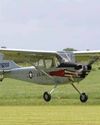
Legend Hobby 13-Foot L-19 Bird Dog/ Cessna O-1
This famous multi-mission single engine observation aircraft served from 1950-1974. From calling out target locations to providing intel/recon information, the Bird Dog was a valued asset in both the Korean War and Vietnam.
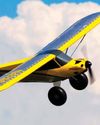
EARN YOUR WINGS
10 Tips for First-Flight Success
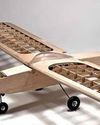
Old School Model Works Fifty Six
The Fifty Six takes its design cues from the original .09- to .15-size Carl Goldberg Falcon 56 of the 1960s. Reworked to incorporate modern, lasercut techniques to make kit building better than ever.
FLYING TWINS Multi-engine warbirds made easy
Let’s face it, there’s just something extra special about twin-engine RC aircraft. Most modelers stop what they’re doing when a twin fires up on the flightline.
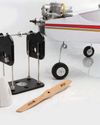
HOW TO BALANCE PROPELLERS
Four easy steps to increase performance and reduce vibration
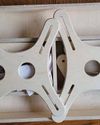
PRODUCT REVIEW: RC PLANE STANDS BENCHTOP MODEL
I’m a sucker for shop stuff. I buy tools I will probably never use just because they are cool, or I might need to use them someday. When Glen from RC Plane Stands reached out about a review, however, I knew as soon as I browsed their website that I would be receiving something I would use a lot, maybe even daily.
SPIRIT OF RHINEBECK AWARD WINNER
A close up of Norman Malinowski’s 1/3-scale Albatros
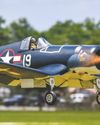
CENTER OF GRAVITY BASICS
The secret to a plane that flies well